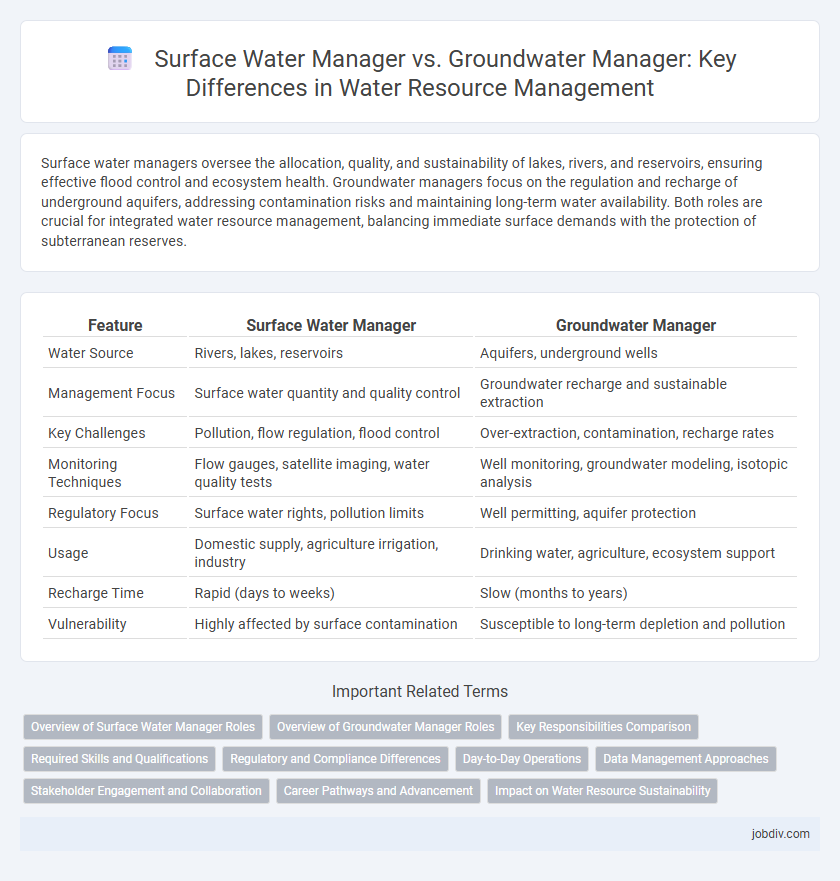Surface water managers oversee the allocation, quality, and sustainability of lakes, rivers, and reservoirs, ensuring effective flood control and ecosystem health. Groundwater managers focus on the regulation and recharge of underground aquifers, addressing contamination risks and maintaining long-term water availability. Both roles are crucial for integrated water resource management, balancing immediate surface demands with the protection of subterranean reserves.
Table of Comparison
| Feature | Surface Water Manager | Groundwater Manager |
|---|---|---|
| Water Source | Rivers, lakes, reservoirs | Aquifers, underground wells |
| Management Focus | Surface water quantity and quality control | Groundwater recharge and sustainable extraction |
| Key Challenges | Pollution, flow regulation, flood control | Over-extraction, contamination, recharge rates |
| Monitoring Techniques | Flow gauges, satellite imaging, water quality tests | Well monitoring, groundwater modeling, isotopic analysis |
| Regulatory Focus | Surface water rights, pollution limits | Well permitting, aquifer protection |
| Usage | Domestic supply, agriculture irrigation, industry | Drinking water, agriculture, ecosystem support |
| Recharge Time | Rapid (days to weeks) | Slow (months to years) |
| Vulnerability | Highly affected by surface contamination | Susceptible to long-term depletion and pollution |
Overview of Surface Water Manager Roles
Surface Water Managers oversee the management, allocation, and quality monitoring of rivers, lakes, and reservoirs to ensure sustainable water supply and ecosystem health. Their roles include flood risk assessment, regulatory compliance enforcement, and coordinating with stakeholders for watershed protection and restoration projects. Effective surface water management supports agriculture, urban development, and environmental conservation by maintaining balanced water flow and minimizing contamination risks.
Overview of Groundwater Manager Roles
Groundwater managers oversee the sustainable extraction and quality of aquifers, ensuring safe drinking water and ecological balance by monitoring recharge rates and contamination risks. They implement policies for well permitting, groundwater modeling, and restoration projects to prevent over-extraction and pollution. Their role often involves coordinating with surface water managers to maintain integrated water resource management and support long-term water security.
Key Responsibilities Comparison
Surface water managers oversee the allocation, quality, and storage of lakes, rivers, and reservoirs to support ecological balance and human use. Groundwater managers focus on regulating aquifer recharge, monitoring water table levels, and preventing contamination through sustainable extraction practices. Coordination between these roles ensures integrated water resource management, addressing both surface and subsurface water availability and quality.
Required Skills and Qualifications
Surface Water Managers require expertise in hydrology, watershed management, and flood control, along with skills in remote sensing and GIS technology for monitoring water quality and flow patterns. Groundwater Managers need advanced knowledge in hydrogeology, aquifer characterization, and groundwater modeling, complemented by proficiency in water well design and contaminant transport analysis. Both roles demand strong analytical skills, regulatory compliance understanding, and experience with environmental impact assessments.
Regulatory and Compliance Differences
Surface water managers primarily navigate regulations under the Clean Water Act (CWA), which governs the quality and discharge into rivers, lakes, and reservoirs, emphasizing pollutant control and watershed management. Groundwater managers operate within frameworks such as the Safe Drinking Water Act (SDWA) and state-specific groundwater protection laws, focusing on contamination prevention, aquifer recharge, and sustainable extraction limits. Compliance for surface water involves monitoring point and non-point source pollution, while groundwater regulation centers on well permits, contamination cleanup, and maintaining aquifer integrity.
Day-to-Day Operations
Surface Water Managers oversee reservoirs, rivers, and lakes to monitor water quality, manage flow rates, and coordinate with weather data for flood control. Groundwater Managers focus on aquifer levels, well maintenance, and contamination monitoring through regular sampling and pump testing. Both roles require real-time data analysis and resource allocation to ensure sustainable water supply and regulatory compliance.
Data Management Approaches
Surface Water Managers prioritize real-time monitoring data from rivers, lakes, and reservoirs using remote sensing technologies and automated gauging stations, enabling dynamic response to fluctuations in water availability. Groundwater Managers rely on predictive data models derived from well logs, aquifer recharge rates, and subsurface geological surveys, facilitating sustainable extraction plans and contamination risk assessments. Integrating Geographic Information Systems (GIS) and sensor networks enhances the accuracy and efficiency of data management for both surface and groundwater resources.
Stakeholder Engagement and Collaboration
Surface Water Managers prioritize collaboration with local communities, agricultural stakeholders, and municipal authorities to address water quality and flood control through integrated watershed management. Groundwater Managers engage with environmental agencies, industrial users, and researchers to monitor aquifer health, promote sustainable extraction, and mitigate contamination risks. Both roles require multi-disciplinary partnerships and transparent communication to balance resource use and ensure long-term water availability.
Career Pathways and Advancement
Surface water managers typically oversee the quality and distribution of rivers, lakes, and reservoirs, requiring expertise in hydrology, environmental science, and regulatory compliance, which can lead to advancement in public utilities or environmental agencies. Groundwater managers specialize in monitoring and managing underground aquifers, focusing on hydrogeology and water resource sustainability, often progressing to roles in water conservation organizations or governmental water resource departments. Both career pathways demand strong analytical skills and offer opportunities for leadership positions in water resource management and environmental policy development.
Impact on Water Resource Sustainability
Surface water managers focus on regulating rivers, lakes, and reservoirs to maintain ecological balance and ensure sustainable water availability for human consumption and agriculture. Groundwater managers oversee aquifer recharge rates and extraction limits to prevent overuse, land subsidence, and contamination, critical for long-term water security. Both roles are essential for integrated water resource management, promoting resilience against climate change and supporting sustainable development goals.
Surface Water Manager vs Groundwater Manager Infographic

 jobdiv.com
jobdiv.com